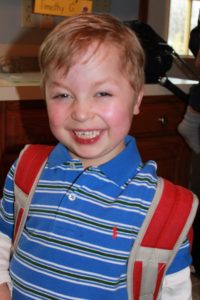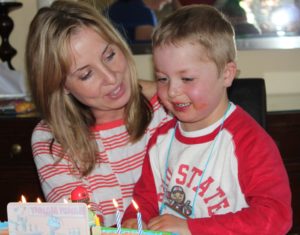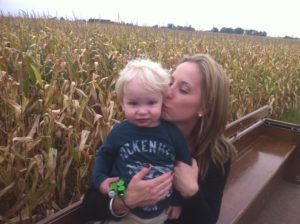My son Ethan was a patient at Boston Children’s Hospital before he was even born. At 20 weeks, we learned he had aortic stenosis and evolving hypoplastic left heart syndrome (HLHS). We live outside Chicago, but were referred to Boston for a fetal cardiac intervention. At 22 weeks Ethan was the 30th baby to undergo an in utero procedure to open his aortic valve and relieve pressure in the left side of his heart. 
Ethan was born in Boston in May of 2005. His first hospital stay was over three months. I still recall his move from the CICU to the floor. I thought I was home free. Then I learned he needed to learn to eat. That began the roller coaster of feeding and working on developmental milestones. Things ebbed and flowed as Ethan’s cardiac status ebbed and flowed. By the time Ethan was 2 he’d had four open-heart surgeries. With that came a collective 8 months in-patient.
In addition to struggling with feeding, Ethan had developmental delays, a lazy eye (strabismus) that affected is depth perception and focus. He struggled with executive functioning and spatial tasks like doing puzzles. During one of our visits to Boston, our cardiology team recommended we see Dr. Janice Ware. She was creating the beginnings of a Cardiac Neurodevelopment Program. Our team suggested she might be able to help us understand and better help Ethan with his development. During our visit to Boston Dr. Ware kindly squeezed us in. She then spent the next two days doing testing with Ethan. He worked quite hard and was such a good sport through it all.
Before we left for home, we sat down with Dr. Ware. I’ll never for get that little room lined with books on one side and sunlight streaming through a window. Here we discussed the results of Ethan’s testing. Dr. Ware went through all the concerns she had for Ethan. The list was long. She recommended additional assistance for him in several areas. We were already doing many of the things she recommended, but we needed to add more to the list. I honestly felt defeated. I felt like I had failed as mom. I was already consumed by meds, vomit, feeding challenges, therapy appointments and doctor appointments. The thought of adding more therapy and more concern to my plate was overwhelming. My tears were plentiful.
Once we got home I dug in. We incorporated some of Dr. Ware’s suggestions to Ethan’s care. Each day was one step, then another, then another. We watched him make progress. His exceptional attitude and joyous, can do spirit made helping him easy. His famous words were, “I will try”.
About a year after our initial visit, I pulled out the 10-page report Dr. Ware had written for us after our first appointment with her. To my surprise, Ethan had accomplished about 80% of the goals she had set. What had felt daunting and overwhelming were now accomplishments. I was so proud of Ethan and of me for our hard work.
As parents, we agree to countless surgeries and procedures for our children because we want them to not only survive, but to thrive. We have plans for them. We want them to enjoy the fullness of life. Congenital Heart Disease brings not only the trauma and heartbreak of the original diagnosis, but also often surgeries, medical procedures and an unknown future. It often times also brings a variety of developmental challenges, too. They can feel so defeating for us parents. It’s hard to put our kids through so much medically, only to then have to teach them to eat, walk, grow, and socialize.
After my first meeting with Dr. Ware, I was honestly angry. I was mad that she picked out all the things Ethan was doing insufficiently. I was mad that he had these challenges. I was mad that he had long difficult medical courses. But in hindsight this meeting was a tremendous gift. I was able to learn more about Ethan, more about the challenges that children and families face as they live with CHD. I realized that Ethan’s challenges were not his alone. Many other children also struggled with similar delays. I was given tools and benchmarks for Ethan. I was able to help him thrive — and thrive he did. This meeting helped me feel more in control and fulfilled as a mother. It took my role beyond that of nurse to that of co-creator of Ethan’s successes. Ethan felt pride in his accomplishments. He was able to more fully participate in school and in life. Watching my son thrive gave me tremendous hope for his future.
This initial visit with Ethan launched me into doing more research about the neurodevelopment of children with CHD. It gave me tools to give to his teachers. It helped me with his first Individualized Education Plan (IEP) meeting. After meeting Dr. Ware, I sought out one of her colleagues closer to home so Ethan could be regularly monitored. I was able to help other families with what I learned through Ethan.
We now know so much more about the neurodevelopment of children with congenital heart disease. In the last 10 years I’ve watched children do better, get more targeted assistance and therapy. I’ve watched parents receive a clearer picture of what challenges to look for and expect. This is progress. We must keep learning through conducting research. We must equip parents with the knowledge and tools they need to help their children thrive. We must educate teachers and school systems about what having congenital heart disease means for brain and motor development. In doing so we’ll keep forging a better future for our children with CHD. We must keep moving forward. 
Ethan died in June of 2012 at age 7. He was the bravest boy I know. He tried harder at life then anyone I know. He was relentless in his pursuit of his goals. He kept trying and kept trying until he achieved whatever goal we set for him. I’m so thankful I had the chance to help him thrive. Before his last hospitalization, my sister, a teacher, commented to me that Ethan had turned a corner in his development. I felt the same. I will always be thankful for the tools I was given to help Ethan.
As Ethan’s mom, I also learned that it’s okay to take a break. I learned to accept that Ethan might not reach some of his goals. And that’s okay. By watching my other boys grow, I have also learned that some of the “Ethanisms” we identified as problematic were really just family traits and in time would have evolved. I learned to relish in the joy of his life and not to attach that joy to his accomplishments. In turn, he became my greatest teacher. I am now thankful for the tears, the hard work, the tender moments, and the million times he told me he loved me.
Our children with CHD are a gift. They are here to teach us and give us a perspective on life and living we’d never have without them. They inspire us to try harder and to live life in a deeper and more meaningful way. The day-to-day can be hard. The path can feel so lonely. The challenges can feel unfair and defeating. Commit to taking it one day at a time, one year at a time. Rest when you must. Relish in the gifts of each day and in the little victories. Seek out the support you need as a parent. At the end of the day it’s about doing your best, not about reaching the goal. Above all, love and accept your child just as they are and give your self a pat on the back for being the most amazing and resilient parent.
This story was written by Jessica about her son, Ethan.
Go to the Heart Experience Journal to read more about the experiences of other families coping with CHD.
Go to the Bereavement Experience Journal to read more about the experiences of other families coping with bereavement and the loss of a child.
